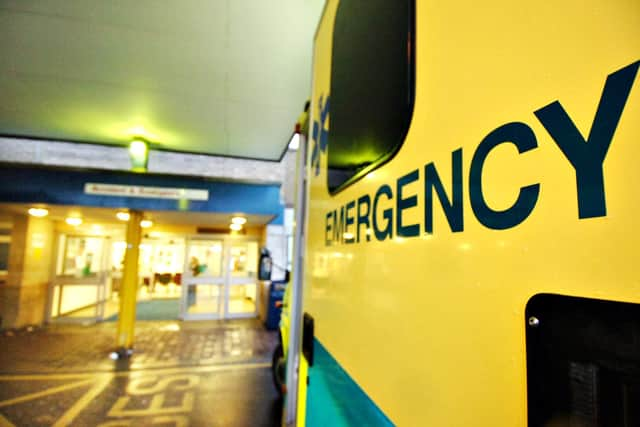NHS crisis: Calderdale's ambulance service declares 'critical incident' and hospital says people in A&E face 'significant' wait ahead of ambulance strike
and live on Freeview channel 276
Yorkshire Ambulance Service has today (Tuesday) declared a critical incident, saying the significant demand pressures are “impacting on its ability to respond safely to patients”.
And Calderdale and Huddersfield NHS Foundation Trust has warned its Accident and Emergency departments are facing “unprecedented pressure” and anyone who comes to A&E should expect “a significant wait”.
Advertisement
Hide AdAdvertisement
Hide AdThe trust – which runs Calderdale Royal Hospital and Huddersfield Roya lnfirmary - has posted on social media: “We will prioritise patients in order of clinical need to keep people as safe as possible”, and urged people to only go to A&E if it is an emergency, serious injury or life-threatening situation.


Yorkshire Ambulance said it has declared a critical incident because there are significant delays for patients waiting for an ambulance, together with a reduction in ambulance crew availability to respond because of delays in handing over patients at the region’s hospitals.
A Yorkshire Ambulance Service spokesperson said: “An extremely high volume of calls is currently having a significant impact on both our 999 and NHS 111 operations and delays in in our ability to respond to patients in our communities.
“Our service is under unprecedented pressure and declaring a critical incident means we can focus our resources on those patients most in need and communicates the pressures we are under to our health system partners who can provide support.
Advertisement
Hide AdAdvertisement
Hide Ad“While the situation is being managed in line with the plans that we have in place to protect our core services, unfortunately there are patients who are facing delays and we are very sorry that we are unable to respond to them as quickly as we would like.
“All emergency calls are categorised according to the nature of a patient’s illness or injury and those in a life-threatening condition are always prioritised.
"It’s important that members of the public only call 999 for an ambulance when it is a serious or life-threatening emergency. This will help us to focus our efforts on our most poorly patients.
“You can also help us by not calling back to check where the ambulance is as we need those phone lines to be free for those in a life-threatening condition. However, if the condition of the patient changes or if you feel you no longer need an ambulance, it’s important that you let us know.
Advertisement
Hide AdAdvertisement
Hide Ad“For anyone with less serious illnesses and injuries, they should consider self-care, their local pharmacy, GP surgery or urgent care centre. For anyone who feels that their condition requires being seen at an emergency department, they should consider making their own way there. Our NHS 111 service is also available online at 111.nhs.uk or by calling 111.
“We will continue to monitor the situation closely and thank all our hard-working staff and volunteers for their efforts at this challenging time.”
Meantime, tomorrow will see the first of two days of industrial action by ambulance service workers.
GMB members are planning to take industrial action tomorrow and on December 28 for 24 hours, between midnight and midnight across all services.
Advertisement
Hide AdAdvertisement
Hide AdUNISON members are planning to take action tomorrow for 12 hours, from midday to midnight, A&E operations only.
The industrial action is part of a national pay dispute with the Government.
Union membership in Yorkshire Ambulance Service of both GMB and Unison is approximately 4,000 staff, out of a workforce of over 7,000.
Nick Smith, Executive Director of Operations at Yorkshire Ambulance Service NHS Trust, said: “With continued operational pressures and the added challenge of industrial action, we will have less resources available to respond. Services will be severely disrupted, with the likelihood of significant delays.
Advertisement
Hide AdAdvertisement
Hide Ad“So, we are urging the public to use the emergency ambulance service more wisely and only to call 999 when someone is in a life-threatening or very serious condition as we prioritise our response to those most in need.
“Ambulances will still be able to respond during the strike, but this will only be where there is an immediate risk to life.
"Less serious calls will not receive a response for the duration of the strike action and some patients might be asked to make their own way to hospital, where it is safe for them to so.
“Patients waiting for an ambulance should only call back if their symptoms worsen or to cancel an ambulance if alternative transport has been arranged, so that our lines are available to take new emergency calls.”
Advertisement
Hide AdAdvertisement
Hide Ad“We also ask that people seek help and advice from alternative healthcare providers, including NHS 111 Online (111.nhs.uk), their own GP or by visiting a pharmacist.
“Looking ahead, we also anticipate that the days between the two strike days will be busy and as we head into the extended Christmas period and would urge everyone to continue to use our services wisely.”